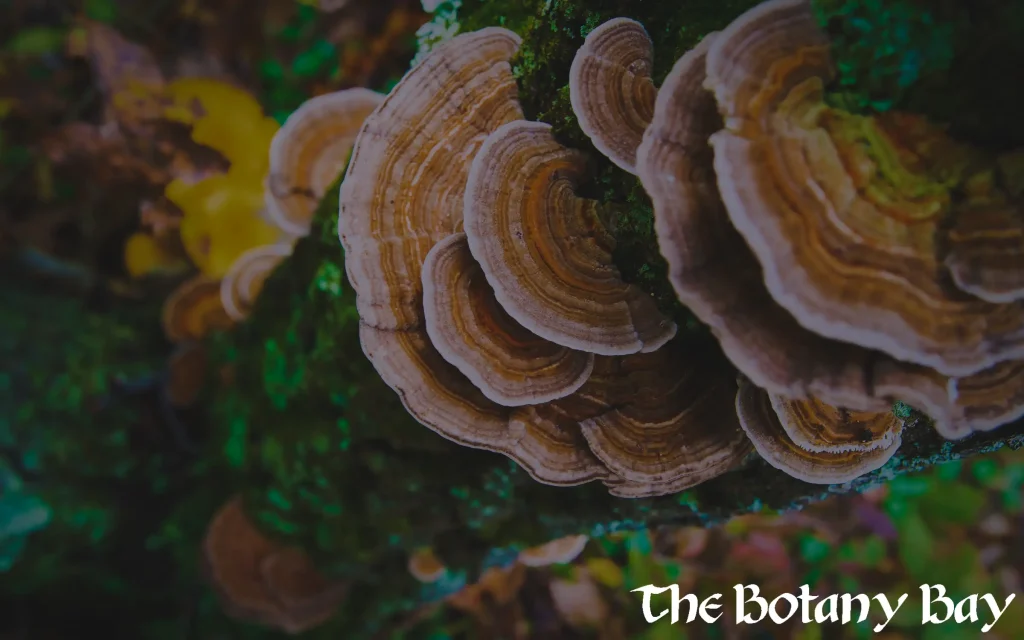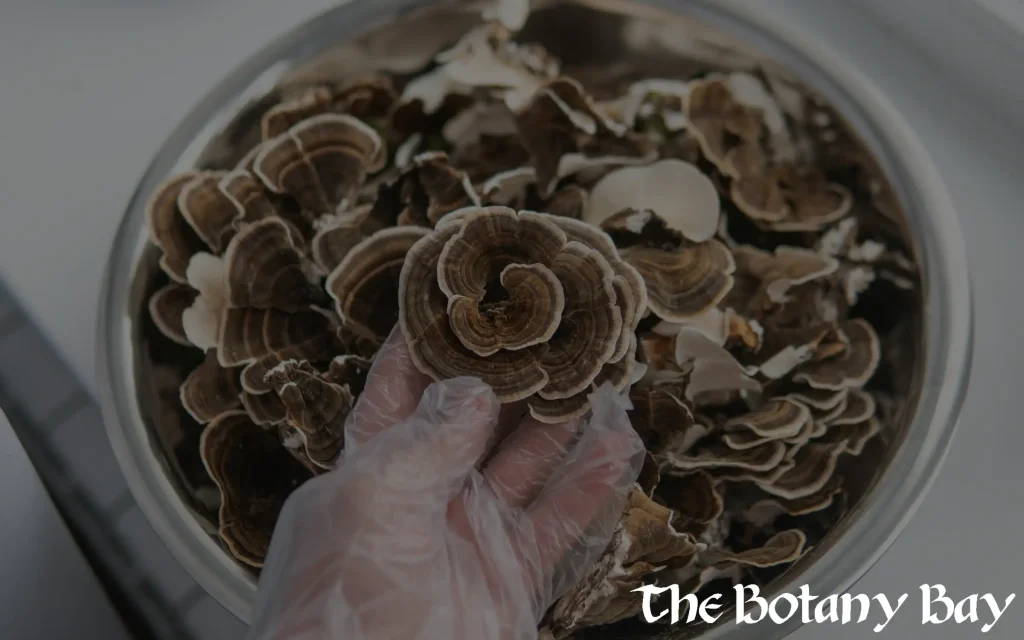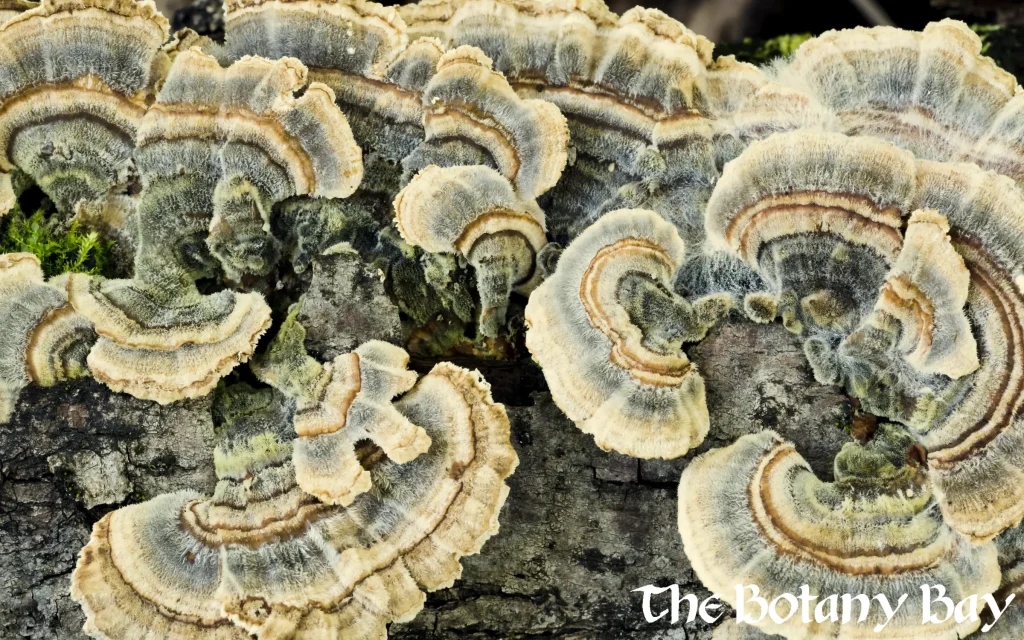Understanding Turkey Tail
Your Comprehensive Guide to Turkey Tail Mushrooms
At The Botany Bay, we believe in helping customers understand the botanicals we carry. Turkey Tail (Trametes versicolor) is a colorful, fan-shaped mushroom that grows naturally on dead logs and trees around the world. Known for its striking, feather-like rings resembling a wild turkey’s tail, this mushroom has been used in traditional herbal practices for centuries. Today, Turkey Tail is valued for its natural compounds, particularly polysaccharides that have drawn scientific interest.

What Is Turkey Tail?
Turkey Tail is a type of polypore mushroom, meaning it grows in thin layers with pores instead of gills underneath the cap. It is one of the most widespread mushrooms in the world, found on nearly every continent.
This mushroom is not typically consumed as food because of its tough, leathery texture. Instead, it is dried, powdered, or extracted for use in teas, capsules, tinctures, and functional mushroom blends.
How Turkey Tail Works in the Body
Research into Turkey Tail suggests that its most important active compounds are beta-glucans, a type of polysaccharide found in the fungal cell wall. Beta-glucans are thought to interact with the immune system, particularly immune cells like macrophages and natural killer cells.
Instead of acting directly like a stimulant, these compounds may modulate immune activity, supporting the body’s natural defense system. Turkey Tail also contains antioxidants and prebiotics, which may support gut health.
Research is ongoing, and effects can vary by preparation and by individual.

Did you know? Global Use
Across cultures. Flip to learn more.
Turkey Tail has been used in Traditional Chinese Medicine (as Yun Zhi) and in Japanese Kampo medicine for centuries, often brewed into teas or decoctions.
Active Compounds
Key bioactive elements, Beta-Glucans and PSK. Flip the box for more info.
Turkey Tail contains unique polysaccharides like PSK (Polysaccharide-K) and PSP (Polysaccharide-Peptide), which have been studied extensively for their role in immune health.
Legal Status of Turkey Tail
Turkey Tail is legal and widely available in the United States and internationally as a dietary supplement. It is not a controlled substance and is often included in functional mushroom products, teas, and capsules.

Reported Effects and Benefits
While individual experiences vary, Turkey Tail is commonly associated with:
Immune system support through its beta-glucan content
Gut health support due to prebiotic compounds that nourish beneficial bacteria
General wellness as part of functional mushroom blends
In Japan, extracts from Turkey Tail (particularly PSK) have been studied as adjuncts to clinical therapies.
These uses are based on historical practices, user reports, and ongoing scientific research. They are not guaranteed and should not replace medical care.
How to Use Turkey Tail
Turkey Tail is usually consumed as an extract or supplement rather than raw:
Capsules — Convenient daily servings of dried or extracted mushroom powder
Powder — Added to smoothies, teas, or wellness blends
Tinctures and liquid extracts — Concentrated forms for flexible use
Teas and decoctions — A traditional preparation method using hot water extraction
Because mushroom cell walls contain chitin, hot water or alcohol extraction is often recommended to make the active compounds more bioavailable.
Testing and Transparency
At The Botany Bay, all Turkey Tail products we carry are:
Third-party lab tested for purity and identification
Screened for heavy metals, pesticides, and contaminants
Sourced from trusted suppliers who ensure ethical and sustainable harvesting
Compliance Disclaimer
This content is for educational purposes only and has not been evaluated by the Food and Drug Administration. Turkey Tail products are not intended to diagnose, treat, cure, or prevent any disease. Always consult a healthcare provider before beginning any new supplement, especially if you are pregnant, nursing, or taking medications.
FAQs About Turkey Tail Mushrooms
Why is it called Turkey Tail?
Can I eat Turkey Tail raw?
Is Turkey Tail the same as Reishi or Lion’s Mane?
Does Turkey Tail contain psilocybin?
NEWSLETTER
Sign up to our newsletter to keep updated with our latest offers and products.
Disclaimer:
Some products sold by The Botany Bay are not scheduled under U.S. federal law but may be subject to restrictions in certain states or localities. The Botany Bay only sells to jurisdictions where these products are legal, and it is the customer’s responsibility to ensure compliance with their local, state, or international laws before purchasing. These products have not been evaluated by the FDA and are not intended to diagnose, treat, cure, or prevent any disease. The Botany Bay does not guarantee compliance with local or international regulations.
© 2025 The Botany Bay All Rights Reserved
- 0 Items
- View Cart
